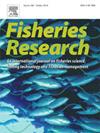Assessing the social-ecological dimensions of Dungeness crab fishery closures in Southeast Alaska from analysis of public records
IF 2.3
2区 农林科学
Q2 FISHERIES
引用次数: 0
Abstract
Spatial management of marine resources is of growing interest at local, national, and international scales. Understanding the characteristics of spatial closures that make them advantageous in areas of intense resource dependency is crucial for understanding their utility as a fishery management tool. Here, we examined the process of establishing fisheries closures for Dungeness crab (Metacarcinus magister) in southeastern Alaska through analysis of publicly available records from the Alaska Board of Fisheries (BOF), a regulatory body that allows members of the public to propose changes to fisheries management. Using 14 years of BOF meeting records, we synthesized a rich dialogue on the social, ecological, and policy dimensions of crab fishery closure proposals. Key themes identified through qualitative analysis of 18 proposals include an emphasis on preserving local access to the fishery, complex social dynamics among user groups, differences in representation by various user groups throughout the public process, concerns around inequitable impacts of closures, and concerns around the quality and quantity of data for managing the fishery. These themes indicate that social needs, rather than ecological concerns, led the justification of proposals. This novel application of public records analysis is a valuable approach for understanding the social and political conditions under which regulatory proposals may succeed or fail, and the role of fishers’ and managers’ values in determining outcomes. Improved knowledge sharing among fishers and management bodies may help to better anticipate and respond to social-ecological change, and address challenges in ways that center community needs.
从公共记录分析评估阿拉斯加东南部邓杰内斯蟹渔业关闭的社会生态维度
海洋资源的空间管理在地方、国家和国际尺度上日益引起人们的兴趣。了解使空间封闭在资源高度依赖地区具有优势的特点,对于了解其作为渔业管理工具的效用至关重要。在这里,我们通过分析阿拉斯加渔业委员会(BOF)的公开记录,研究了阿拉斯加东南部邓吉斯蟹(Metacarcinus magister)建立渔业关闭的过程,BOF是一个允许公众提出渔业管理改革建议的监管机构。利用14年的BOF会议记录,我们就螃蟹渔业关闭建议的社会、生态和政策层面进行了丰富的对话。通过对18项建议进行定性分析确定的关键主题包括强调保留当地渔业的机会、用户群体之间复杂的社会动态、在整个公共过程中不同用户群体的代表性差异、对关闭的不公平影响的关切以及对管理渔业数据的质量和数量的关切。这些主题表明,社会需求,而不是生态问题,主导了提案的正当性。这种对公共记录分析的新颖应用是一种有价值的方法,可以帮助我们理解监管提案可能成功或失败的社会和政治条件,以及渔民和管理者的价值观在决定结果中的作用。改善渔民和管理机构之间的知识共享可能有助于更好地预测和应对社会生态变化,并以满足社区需求的方式应对挑战。
本文章由计算机程序翻译,如有差异,请以英文原文为准。
求助全文
约1分钟内获得全文
求助全文
来源期刊

Fisheries Research
农林科学-渔业
CiteScore
4.50
自引率
16.70%
发文量
294
审稿时长
15 weeks
期刊介绍:
This journal provides an international forum for the publication of papers in the areas of fisheries science, fishing technology, fisheries management and relevant socio-economics. The scope covers fisheries in salt, brackish and freshwater systems, and all aspects of associated ecology, environmental aspects of fisheries, and economics. Both theoretical and practical papers are acceptable, including laboratory and field experimental studies relevant to fisheries. Papers on the conservation of exploitable living resources are welcome. Review and Viewpoint articles are also published. As the specified areas inevitably impinge on and interrelate with each other, the approach of the journal is multidisciplinary, and authors are encouraged to emphasise the relevance of their own work to that of other disciplines. The journal is intended for fisheries scientists, biological oceanographers, gear technologists, economists, managers, administrators, policy makers and legislators.
 求助内容:
求助内容: 应助结果提醒方式:
应助结果提醒方式:


